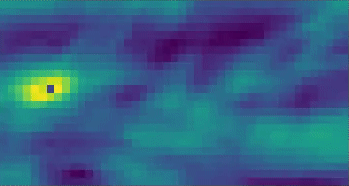Dynamic Neural Fields
Introduction
Dynamic Neural Fields (DNF) are neural attractor networks that generate stabilized activity patterns in recurrently connected populations of neurons. These activity patterns form the basis of neural representations, decision making, working memory, and learning. DNFs are the fundamental building block of dynamic field theory a mathematical and conceptual framework for modeling cognitive processes in a closed behavioral loop.
Voltage of a selective dynamic neural field tracking moving input

What is lava-dnf?
lava-dnf is a library within the Lava software framework. The main building blocks in Lava are processes. lava-dnf provides processes and other software infrastructure to build architectures composed of DNFs. In particular, it provides functions that generate connectivity patterns common to DNF architectures.
The primary focus of lava-dnf today is on robotic applications: sensing and perception, motion control, behavioral organization, map formation, and autonomous (continual) learning. Neuromorphic hardware provides significant gains in both processing speed and energy efficiency compared to conventional implementations of DNFs on a CPU or GPU (e.g., using cedar or cosivina).
Key features
Building DNF architectures
Based on spiking neurons
DNF dimensionality support for 0D, 1D, 2D, and 3D
Recurrent connectivity based on kernel functions
Forward connectivity to connect multiple DNFs
Structured input from spike generators
Running DNF architectures
On CPU (Python simulation)
On Loihi 2
Examples demonstrating basic DNF regimes and instabilities
Detection of input
Selection of input
Working memory of input
Relational networks
Example
from lava.proc.lif.process import LIF
from lava.lib.dnf.kernels.kernels import SelectiveKernel
from lava.lib.dnf.connect.connect import connect
from lava.lib.dnf.operations.operations import Convolution
# Create a population of 20x20 spiking neurons.
dnf = LIF(shape=(20, 20))
# Create a selective kernel.
kernel = SelectiveKernel(amp_exc=18, width_exc=[4, 4], global_inh=-15)
# Apply the kernel to the population to create a DNF with a selective
# regime.
connect(dnf.s_out, dnf.a_in, [Convolution(kernel)])